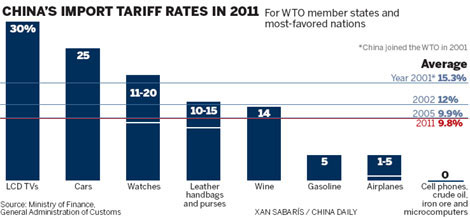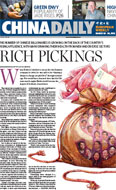China to boost imports from Europe, United States
Updated: 2011-03-11 10:46
By Ding Qingfen and Wang Xiaotian (China Daily European Weekly)

China will encourage more imports from the European Union (EU) and the United States this year in an effort to ease trade imbalances, according to the head of the trade promotion organization.
Wan Jifei, chairman of the China Council for the Promotion of International Trade, told China Daily at the sidelines of the annual session of the Chinese People's Political Consultative Conference (CPPCC) National Committee, that China will send more trade delegations to Europe and the US this year to stimulate imports.
The delegations will purchase goods, especially energy-saving and environmentally-friendly products, with the aim of balancing trade between China and those regions.
"During the first half (of the year), we will have one team each for the US and the EU - including Britain, Germany and France - and in the second half, one more each for both regions," says Wan.
Since the second half of 2010, China has vowed to take measures to stimulate imports. Minister of Commerce Chen Deming had earlier hinted that China will strive to balance trade in 2011 by boosting imports and stabilizing exports.
Mechanical and electrical products, especially those related to new energy, new materials and saving energy, will be given priority when it comes to imports. Imports of these products will also give a fillip to the global economy, say commerce ministry officials.
"Maintaining balanced trade is an urgent task for China. We will not only organize more trade delegations this year, but also increase efforts to hold more import-themed forums and exhibitions," says Wan.
Earlier this year, China appointed two vice-ministers of commerce to lead two trade delegations to the US during President Hu Jintao's state visit to the country.
Also, a business delegation inked deals worth $20 billion (14 billion euros) during Vice-Premier Li Keqiang's visit to Spain, Germany and the United Kingdom.
"China expects to show its willingness to reduce its trade surplus with developed nations through more frequent trade delegations. And the trade contracts could also be of some help to the economic recovery of the US and the EU," says Zhou Shijian, senior trade expert with Tsinghua University.
China runs huge trade surpluses with the US and the EU. In 2010, the surplus with the US was $181.3 billion, and that with the EU was $142.8 billion.
"Besides the large delegations, we will send a slew of smaller groups to nations around the world," says Wan. But "the impact (of the trade delegations) on promoting imports may be limited", he conceded.
Premier Wen Jiabao, when delivering his annual work report to the National People's Congress on March 5, vowed that the government will adopt a slew of measures to further stimulate imports as the country seeks a more balanced trade relationship with other countries.
Import tariffs for resources and high-tech products will probably soon be lowered and favorable rules could also be on the way to ensure people buy luxury goods in China instead of heading overseas, according to Jia Kang, head of the Research Institute for Fiscal Science affiliated to the Ministry of Finance.
He says the new rules could be announced very soon, but the specifics rest with ministry officials.
With increased imports of high-tech products, green technology, resource-related goods (such as iron ore) as well as simplified procedures and tariff cuts on certain items, the trade surplus will decrease further this year and may even go into deficit for a few months, the commerce minister said on March 7.
The surplus has been in decline in recent years. In 2010 it decreased by 6.4 percent, from a year earlier, to $183.1 billion. This followed a 34 percent fall to $196.1 billion in 2009, from a year earlier.
In January, the surplus dropped by 53.5 percent year-on-year to $6.46 billion. In February, the country even suffered a deficit of $7.3 billion because of the Chinese New Year holidays.
"The surplus will further drop in 2011. While export growth will decelerate, import growth will accelerate," Chen said at a news conference.
Import growth outmatched the increase in exports in recent months as global demand remained fragile and commodity prices surged.
In 2010, exports grew by 31.3 percent, compared with 38.7 percent for imports.
E-paper

City of Joy
Welcome to the 'world of smiles' where life meanders slowly.
Preview of the coming issue
Debate on nuclear power revived
The future is now
Specials

Beloved polar bear died
Berlin's beloved polar bear Knut, an international star died Saturday.

Panic buying of salt
Worried Chinese shoppers stripped stores of salt on radiation fears.

'Super moon'
The "Super Moon" arrives at its closest point to the Earth in 2011.
